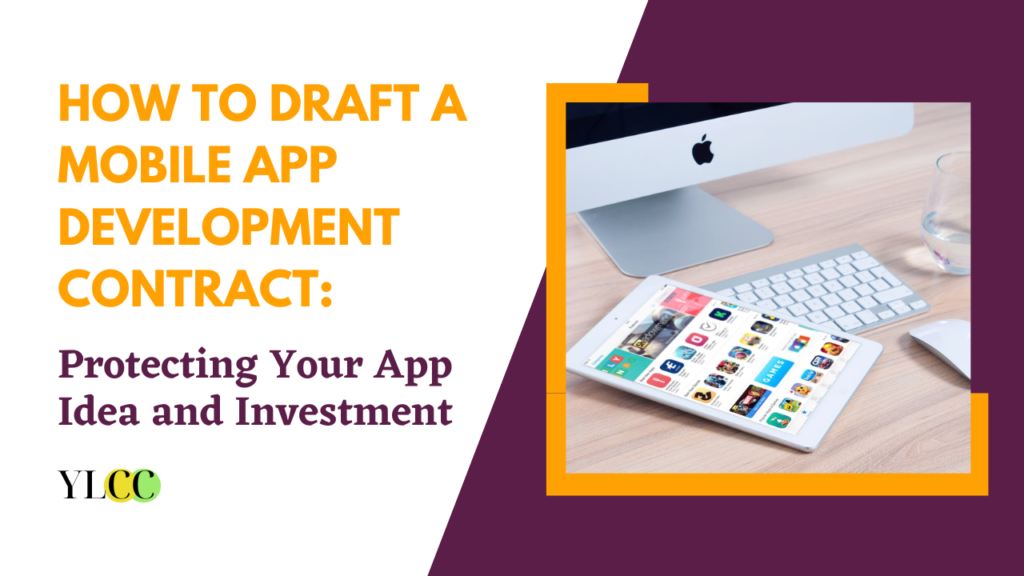
INTRODUCTION
Mobile apps are becoming increasingly popular in today’s digital world. As more and more entrepreneurs invest their time and resources into creating mobile apps, it becomes crucial to protect the app idea and investment. One effective way to do this is by having a comprehensive mobile app development contract in place.
As an app developer or an entrepreneur, you may have invested significant resources in the design, development, and marketing of your app. To ensure that your app idea and investment are protected, it is essential to have a solid mobile app development contract in place.
A mobile app development contract is a legal agreement that outlines the terms and conditions between the app developer and the client. The contract not only serves as a guide for the development process, but it also protects both parties in case of any disputes that may arise. By clearly outlining the roles and responsibilities of both the app developer and the client, the contract minimizes misunderstandings and miscommunications that may lead to disputes.
One of the key benefits of a mobile app development contract is that it can help to minimize the risk of misunderstandings and disputes between you and your client, and by clearly defining the scope of work, project timeline, payment terms, and other critical details, you can ensure that both parties are on the same page from the outset of the project. Additionally, the contract can provide a framework for resolving any disagreements that may arise during the course of the project.
Thus, from Concept to Launch, a Mobile App Development Contract can secure your app idea and investment. Team Your Legal Career Coach (YLCC) brings you the ultimate guide to drafting a Mobile App Development Contract for your business.

THE KEY ELEMENTS/CLAUSES OF THE MOBILE APP DEVELOPMENT CONTRACT
Scope of Work Clause
Defining the scope of work in a mobile app development contract is critical to ensuring that both parties are aware of their respective responsibilities and obligations and that the project is completed to the satisfaction of all parties involved. By defining the scope of work, the developer and the client can work together to ensure that the final product meets the client’s expectations and requirements.
The scope of work section of the mobile app development contract should clearly identify the specific tasks, deliverables, and timelines associated with the project. This can include a detailed description of the app design, development, testing, and maintenance, as well as any other specific requirements or features that the client wishes to include in the app. Additionally, any third-party services or software that will be used in the development process should be identified and incorporated into the scope of work.
It is equally important to identify any limitations or exclusions on the scope of work. This can include any features or functionalities that are outside the scope of the project, as well as any dependencies or constraints that may impact the project timeline or budget. By clearly defining these limitations or exclusions, both parties can avoid misunderstandings and disputes that may arise later in the project. The scope of work section should be drafted with clarity and specificity, to ensure that both parties understand the scope of the project and their respective obligations.
Developer Engagement Clause
The Developer Engagement is a section in a mobile app development contract that outlines the specific developer or development team who will be responsible for creating the app. This clause is essential because it ensures that the developer is legally bound to complete the project within the terms of the contract and that the client has a clear understanding of who is responsible for creating the app.
The Developer Engagement Clause should include the following information:
- Identification of the developer or development team who will be responsible for creating the app.
- The developer’s obligations and responsibilities, including the scope of work, timelines, milestones, and deliverables (this can be included as a separate clause also).
- Any specific qualifications, certifications, or experience required of the developer or development team.
- Any additional terms or conditions, such as non-disclosure provisions, non-compete provisions, etc.
The developer Engagement Clause in a mobile app development contract ensures that both the parties have a clear understanding of what is expected of the developer and what they will be responsible for throughout the app development process. This can help to avoid misunderstandings or disputes later on and ensure that the app is completed to the client’s satisfaction.
Obligations of the Developer Clause
The Developer Obligations Clause is an essential component of a mobile app development contract. This clause outlines the responsibilities of the developer in relation to the development of the app. It is crucial to have this clause in the contract to ensure that the developer is aware of what is expected of them during the app development process.
The clause should detail the obligations of the developer, including the timeline for development, deliverables, testing, and maintenance. It should specify the standards to which the developer must adhere and outline the consequences for failing to meet those standards. This clause may also include information about the tools and resources that the developer will use during the development process.
It is essential to make sure that the developer obligations clause is drafted in a clear and concise manner. This will ensure that both parties understand what is expected of them and that there is no ambiguity regarding the developer’s obligations. Additionally, including this clause in the contract helps to establish a level of accountability for the developer and protects the client’s interests by ensuring that the developer is held responsible for any delays or issues that arise during the development process.
Here are some examples of obligations that could be included in the Developer Obligations Clause:
- The developer must provide regular updates to the client on the progress of the app development.
- The developer must use best practices and industry standards in the development of the app.
- The developer must provide technical support and maintenance for a specified period of time after the app launch.
- The developer must deliver all work products, including source code and documentation, to the client upon completion of the project.
- The developer must ensure that the app is free from errors and defects that could impact its functionality.
- The developer must conduct thorough testing of the app before its launch to ensure that it meets all requirements and specifications.
- The developer must obtain all necessary licenses and permits for the use of third-party software or technology in the app.
Independent Service Provider Clause
The Independent Service Provider clause in a mobile app development contract is an essential provision that sets forth the relationship between the parties. It establishes that the developer is an independent contractor and not an employee or agent of the organization. This clause is important because it ensures that both parties understand and agree that they are not entering into an employer-employee relationship. This provision protects the organization from any potential liability associated with the actions of the developer.
Some of the important points to consider while drafting this clause are:
- The developer is not an employee or agent of the organization and will not be treated as such for any purpose.
- The developer is responsible for their own taxes, insurance, and other expenses associated with their work.
- The developer will not receive any benefits, such as health insurance or paid time off, from the organization.
- The developer has the right to work for other clients during the term of the contract.
- The organization has no control over how the developer performs their work, as long as it meets the requirements of the contract.
- The organization will not be held liable for any damages caused by the actions of the developer.
Obligations of Customer Clause
This clause outlines the responsibilities and obligations of the customer or client in a mobile app development contract, and is important to ensure that the customer provides the necessary resources and support needed for the successful completion of the mobile app development project.
Examples of customer obligations that may be included in this clause include:
- Providing the developer with clear and detailed project requirements and specifications.
- Providing necessary access to any third-party services or APIs required for the development of the mobile app.
- Providing timely feedback and approvals on design mockups, prototypes, and other deliverables.
- Ensuring that all content provided for use in the mobile app is legal and does not infringe on any third-party rights.
- Ensuring timely payment of all invoices and fees as outlined in the payment terms section of the contract.
- Ensuring that any personnel involved in the project on the customer’s side adhere to the project schedule and deadlines.
It is important for both parties to clearly understand and agree upon the customer’s obligations to avoid any misunderstandings or delays in the project timeline.
IP Clause
This clause is an essential part of a mobile app development contract that defines the ownership and usage of the app and its components. It is crucial because the developer and the customer need to have a clear understanding of who owns the intellectual property rights to the app and its components to avoid disputes in the future.
The clause should outline the ownership and usage rights of the app and its components, including the source code, design, graphics, logos, and trademarks. It should also specify who has the right to modify and use the app and its components. It is important to clarify the terms and conditions of any licensing agreements, royalty fees, and usage restrictions related to the app and its components.
Furthermore, the clause should address the consequences of any breach of intellectual property rights and specify the indemnification or hold harmless provisions related to such breaches. This can include legal fees, damages, and any other costs incurred as a result of a breach of intellectual property rights.
Examples of what should be included in the intellectual property rights section are:
- A statement of who owns the app and its components, including any third-party software or tools used in the development process.
- A provision stating who has the right to use and modify the app, such as the developer or the customer.
- A clause addressing any licensing agreements or permissions required for using third-party software or tools in the app.
- A description of any limitations or exclusions on the customer’s use of the app, such as the geographic location or the specific purpose of use.
- A provision stating how ownership or use of the app can be transferred, such as through an acquisition or sale of the customer’s business.
CONCLUSION
A website development contract is crucial in ensuring a successful and smooth website launch. The key elements that must be included in such a contract include a clear description of the project scope, timeline, payment terms, quality assurance and testing, confidentiality and non-disclosure, intellectual property rights, and conclusion clauses. By including these key elements, both the client and the developer can clearly understand their respective obligations and expectations, which helps to minimize misunderstandings, disputes, and other legal issues.
It is important to avoid common mistakes while drafting a website development contract, such as using vague language, omitting essential details, neglecting to define responsibilities, and failing to include provisions for dispute resolution. Seek the advice of a legal professional or use a reputable website development contract template to ensure that all necessary elements are included.
Disclaimer: This article is for information purposes only. You are advised to consult a legal professional for drafting such crucial documents for your business.
This article has been written by Team YLCC. For any other queries, reach out to us at: queries.ylcc@gmail.com






